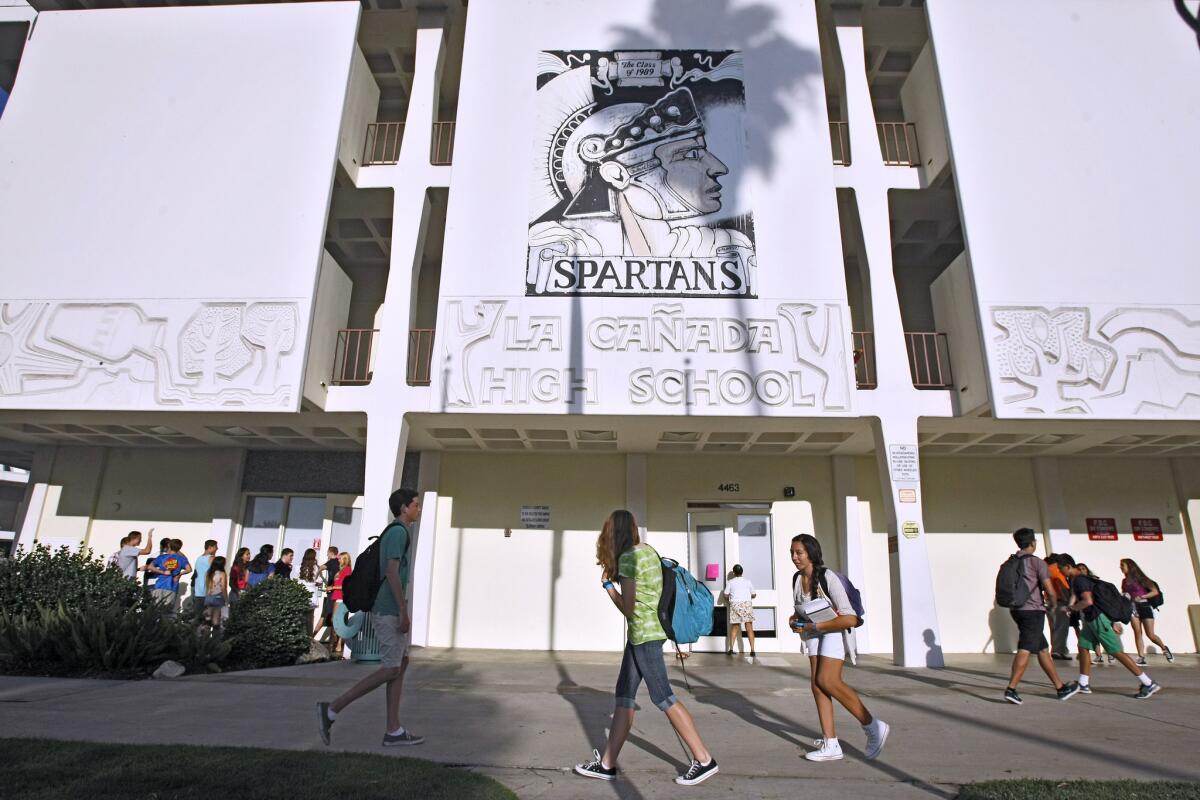LCUSD voters support renewing $450 parcel tax indefinitely, survey says

- Share via
La Cañadans desire high-quality public schools and are willing to pay for them — that was the determination of a recent study designed to gauge interest in extending a La Cañada Unified School District parcel tax set to expire in 2021.
Charles Heath, partner at San Francisco-based TBWB Strategies, and Tim McLarney, owner of Encinitas survey research firm True North Research, shared with school board members in a special meeting Tuesday key findings from a 12-day email and telephone survey conducted in July.
Some 482 district voters were asked to weigh in on the prospect of continuing a $450 per-parcel tax to maintain schools and programs for an indefinite period of time.
Based on the outpouring of support they heard from respondents, consultants recommended LCUSD consider placing a renewal before voters as early as March 2020 at the current tax rate, with annual consumer price index (CPI) adjustments added to safeguard the district’s purchasing power against future inflation.
The current parcel tax brings the district around $2.6 million annually that can be applied toward instructional programs and technology, hiring and retaining teachers and managing classroom sizes, among other things. Were it to expire, LCUSD would lose that revenue.
An initial ballot test showed 73% of survey respondents would “definitely” or “probably” support a parcel tax extension — far above the two-thirds (67%) approval required for passage. About 19% of respondents said they were against a tax extension.
“We are 5% above that two-thirds threshold on that initial ballot test — that’s a really good place to start,” McLarney told board members.
During the course of the survey, voter support climbed to 75% when researchers shared with respondents positive arguments for continuing the tax, such as maintaining high academic performance, forestalling district cuts and keeping finances secure despite state-level uncertainties.
When researchers shared arguments against an extension — the unfair burden such a move would place on property owners, the lingering threat of recession and a tax that would essentially have no end — support dropped to 70%.
Researchers floated the idea of the parcel tax being continued indefinitely, even though the current tax has a seven-year lifespan and a $150 tax passed in 2009 lasted just five years. They also attempted to determine whether voter support would waiver if annual inflation adjustments of up to 3% were added to the base tax.
Given both scenarios, respondents roundly supported continuing the tax.
Among the spending priorities identified by survey respondents, attracting and retaining qualified teachers took the top spot with 92.4% of those polled answering strongly or somewhat in favor, followed by continued funding for STEM programs and campus safety and maintenance (tied at 90.7%) and managing class sizes (90.4%).
Board member Dan Jeffries supported the district pursuing the parcel tax renewal in the March 2020 election but said time is of the essence.
“It does put us on a very tight time frame, because I think especially with our community we want to make sure it’s well vetted and discussed,” Jeffries said. “We need to start getting the message out there that we’re considering doing that.”
“We’d need to make good use of September and October,” Heath agreed.
Board members plan to further review the findings and anticipate discussing future steps at their Sept. 10 regular meeting.
Support our coverage by becoming a digital subscriber.
